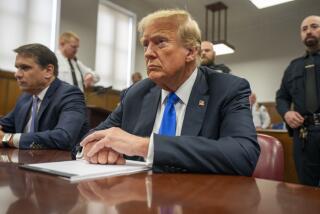Lewinsky Trial Could Be Worse for President
- Share via
A rough consensus seems to have emerged that Kenneth Starr cannot make a case against the president without Monica Lewinsky’s cooperation. Because that cooperation does not appear to be forthcoming, the conventional wisdom holds that Starr will wrap up his investigation by compelling Lewinsky and perhaps the president to testify before the grand jury under a grant of immunity and then providing an impeachment report to Congress. Congress will then devolve into partisan wrangling over how to review the independent counsel’s evidence and what to do with it; the public will shrug the matter off and continue to support the president; and, whether hearings are held, Congress will take no action.
What this ignores is that Starr has available to him an alternative course of action, which would be both better calculated to establish the truth of the Lewinsky matter and infinitely more threatening to President Clinton: Indict Monica Lewinsky for perjury, subornation of perjury and conspiracy to obstruct justice. While not without risk for Starr’s prosecutors, this looks increasingly likely in light of their obvious belief that Lewinsky is not prepared to tell the whole truth.
If Lewinsky elected to stand trial, the jury and the public would be treated to more than 20 hours of tape recordings of her discussing her sexual relationship with the president; possible testimony by her mother and others confirming that she told them about the relationship; testimony by Linda Tripp about Lewinsky’s statements about the relationship and efforts to get Tripp to lie under oath ; discussions of the mysterious “talking points” that outlined false testimony for Tripp to give in the Jones case; evidence of Lewinsky’s excellent adventure at the White House and Pentagon and the efforts by presidential power brokers to secure lucrative private-sector employment for her; statements of her own lawyer that undercut her story and her credibility; and the surreptitious return of gifts given to her by the president when a subpoena was in the offing. That she and the president might both deny that there was a sexual relationship between them would not prevent the jury from concluding the opposite based upon this other evidence.
If Starr obtained a guilty verdict against Lewinsky, he would have accomplished indirectly what he has been unable so far to accomplish directly: He would have made a legal case against the president. A verdict against Lewinsky would be tantamount to a verdict against Clinton. She cannot be guilty of perjury unless the president is too, and if a jury concludes beyond a reasonable doubt that she conspired to obstruct justice and suborn perjury, it will no longer be possible to avoid uncomfortable questions about the White House’s and the president’s role in that conspiracy.
At a minimum, a jury verdict against Lewinsky would be an implicit finding that the president committed perjury and lied to the American public, and such a verdict would be the judgment of 12 ordinary citizens, whose assessment of the evidence could not easily be tarred as the product of partisanship or politics. Since the president probably cannot be indicted while still in office, this may be the worst legal injury that could be inflicted on him.
A Lewinsky trial would allow Starr to present his evidence to the public in a judicial, rather than legislative, forum. This would eliminate the risk that an impeachment inquiry would become a subject of internecine Republican squabbling, which could both discredit the evidence against the president and deflect public attention away from it. It would deprive the president’s supporters of the ability to disparage the fact-finding process with charges of partisanship and political motivation.
As the sordid history of the Lewinsky affair was aired in federal court, public opinion might begin to turn against the president in a way that it would not if the same evidence were aired in Republican-led committee hearings. And a guilty verdict would provide political cover to members of Congress wishing to vote in favor of Clinton’s removal from office.
Finally, Clinton would almost certainly be required to testify on Lewinsky’s behalf. Although he could assert his 5th Amendment privilege to avoid testifying, the political costs of doing so probably would be considered unacceptably high. A Lewinsky trial may be the only way the president ever would be required to answer the charges against him under oath, without immunity, in detail and in public. It thus has the potential to be the defining episode in this scandal, one that catalyzes the long-expected but so far never-arriving presidential free fall.
More to Read
Sign up for Essential California
The most important California stories and recommendations in your inbox every morning.
You may occasionally receive promotional content from the Los Angeles Times.













